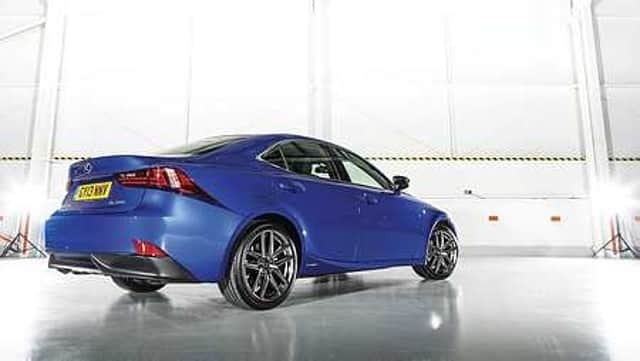Lexus IS300h F Sport


Lexus IS300h F Sport
Engine: 2,494cc, four-cylinder, petrol engine and electric motor
Power: 220bhp and torque (n/a)
Performance: 0-62mph in 8.1 seconds and 145mph
Economy: 60.1mpg (combined)
CO2 emissions: 109g/km
Price: £33,495
The difference between them and a Lexus is that they were always attractive underneath it all...and we all knew it.
Advertisement
Hide AdAdvertisement
Hide AdAs lauded as our favourite TV stars as stars of the luxury car sector, Lexus has long struggled to impose itself in style terms.
With a pipe and slippers approach prioritising comfort and reliability Lexus could have featured decorative cushions on its options list and its regular customers wouldn’t have batted an eye-lid.
Times have changed.
A previously latent devilment emerged when Lexus launched the 416bhp IS-F saloon in 2008 and the 552bhp V10-propelled ISF supercar some two years later.
I knew Lexus’ design revolution was nearing completion when I saw the terrifying LF-NX concept at last autumn’s Frankfurt Motor Show. If Darth Vader was ever to hanker over an SUV, this would be it.
Advertisement
Hide AdAdvertisement
Hide AdThis is the new IS saloon. Comfortably Lexus’ most striking mainstream creation to date, it is a car that has the ability to put BMW’s 3-Series, Audi’s A4 or the Mercedes C-Class in the shade in a car park posturing war.
With the added aggression of the sporty F Sport specification seen here — which adds 18 inch alloys, a spangly mesh grille and LED fog lights — it is a truly striking entry to an often understated segment.
Available with either a 205bhp, 2.5-litre V6 petrol engine, in IS250 form, or with the combination of a 178bhp 2.5-litre, four-cylinder petrol engine and a 141bhp electric motor in the IS300h hybrid tested here it also boasts technology to match its futuristic looks.
The IS300h F Sport tested here comes in at £33,495.
In the metal it is the dramatic front grille, dramatically rising side skirts and a gaping rear diffuser that will catch the eye.
Advertisement
Hide AdAdvertisement
Hide AdOn paper, it is the hybrid’s performance advantage over its petrol stablemate (8.3 versus 8.1 seconds in a sprint to 62mph and 125mph versus 145mph top speeds) and the fact that it beasts it in terms of economy and emissions with claims of 60.1mpg and 109g/km CO2s as opposed to 30.7mpg and 213g/km.
To business users, those kind of figures make the Lexus hybrid extremely alluring and put it in keen contention with its most frugal, diesel-powered rivals.
Inside the IS300h F Sport spec fantastic sports seats can be found nestled behind a tiered dash board festooned with buttons. This, despite the fact that most operations can be carried out through the combination of a seven-inch colour screen and a super sensitive joystick mounted on the centre console.
It’s a busier place than the interior of the key German equivalents, and there are hard plastics in evidence, but there is a cockpit-like appeal to the interior’s added complexity and the seating position is spot-on.
Advertisement
Hide AdAdvertisement
Hide AdMy favourite IS party-piece is the instrument cluster’s dial which not only transforms from a blue eco-centric power readout to a red rev counter when SPORT settings are activated, but can slide aside to reveal a colour trip computer display.
A sculpted leather steering wheel sporting the F Sport logo and drilled aluminium pedals also remind you of this IS’s sporting intent.
On the road things don’t quite stack up as those on-paper stats might have had you believe.
Maximum combined power from the 178bhp petrol and 141bhp electric motors is actually 220bhp.
Advertisement
Hide AdAdvertisement
Hide AdThe electric motor’s low-down torque helps ensure that overtaking pace is brisk and that the 300h can cover ground at a fair lick, but — perhaps because of its unconventional delivery — it never feels as quick as a BMW 320d.
The F Sport package’s firmer suspension takes the edge off most bumps, meanwhile, but can feel a little unforgiving on broken surfaces.
I am not a fan of constantly variable transmissions and, sadly, one comes as part of the parcel of the IS300h’s drivetrain.
It means a constant drone of high revs accompanies sustained acceleration and undermines the otherwise impressive refinement of the IS300h — a car capable of running completely silently in full electric mode.
Advertisement
Hide AdAdvertisement
Hide AdLexus have fitted paddle shifters to the steering wheel which access set ratios within the ‘box, but it simply does not offer the same control as either a dual-clutch or conventional automatic.
Attempts have been made to redress the unappealing soundtrack, as much ushered in by the CVT as the hybrid drivetrain, with the inclusion of Active Sound Control, an audio feed delivering synthesised engine noises into the cockpit, but it just isn’t the same...
I loved the way the IS300h F Sport looks. The geek has well and truly shed its glasses and its unconventional style has its rivals licked.
With an interior that was worthy of praise for its innovation and technology it is a car that offers a classy and slightly unorthodox package which is refreshingly different.
In terms of outright driving enjoyment a diesel-powered German motor will deliver the more engaging drive and similar real-world running costs, though.